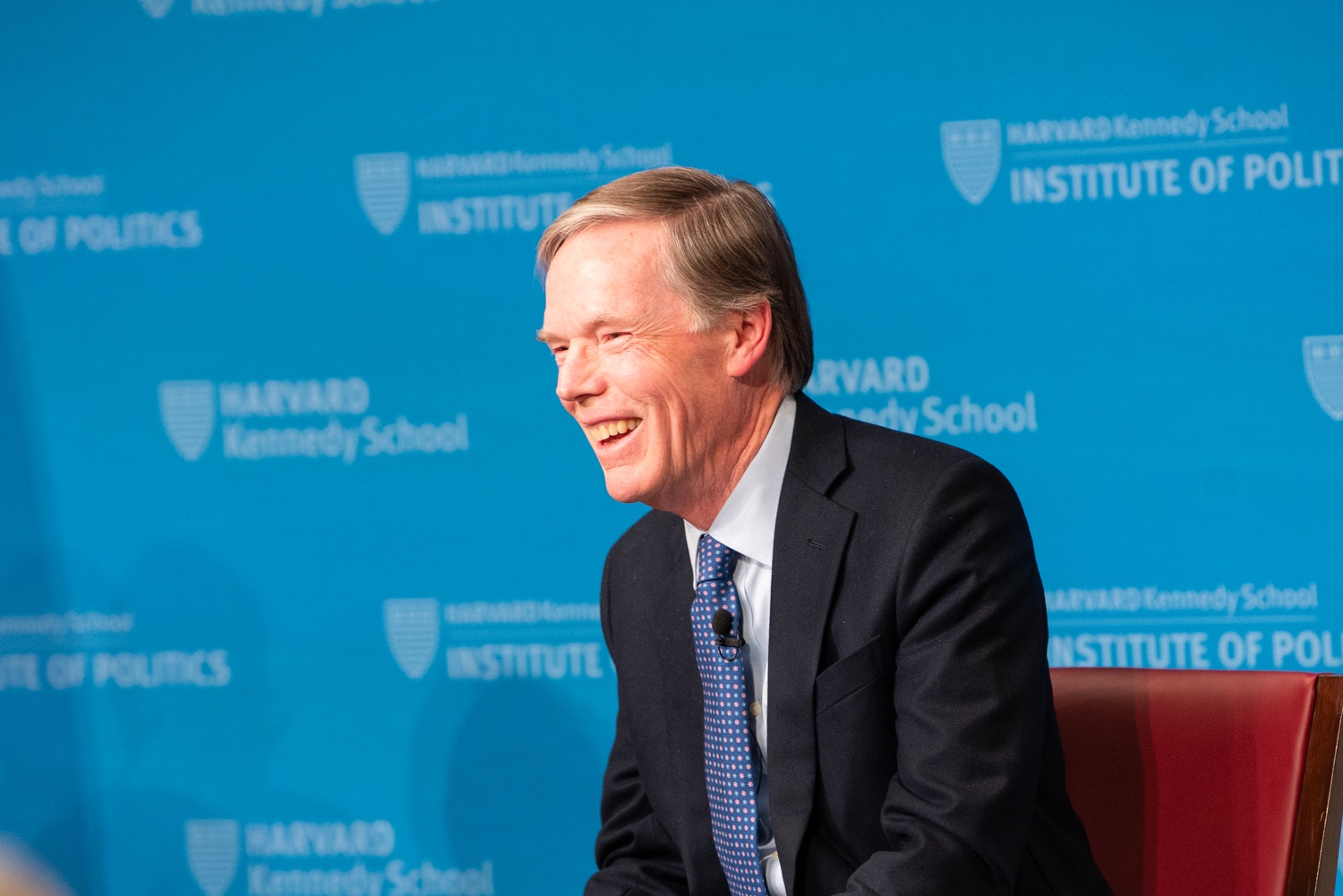
News
FAS Declines To Debate Resolution Condemning Trump

News
‘MegaCambridge Is Inevitable’: Cambridge City Councilor Files Policy Order to Annex Boston

News
Hoekstra Defends CMES Dismissals at Faculty Meeting, but Wavers on Harvard’s Next Move

News
300 Protesters Rally Against Trump, Garber, and Leadership Changes to University Centers

News
Harvard’s Indirect Cost Rate, Explained
‘Be Nice to Allies’: Former Ambassador to China Nicholas Burns Emphasizes Diplomatic Civility at IOP Forum

Former United States Ambassador to China R. Nicholas Burns stressed the importance of maintaining strong relationships with U.S. allies in limiting Chinese global influence at an Institute of Politics forum on Wednesday.
“Four words: be nice to allies. Seriously,” Burns said, to the laughter and applause from the forum audience.
Though Burns commended the Trump administration’s decision to keep tariffs on Chinese technology sectors, and applauded their decision to sanction Chinese officials for human rights violations, he strongly criticized the government’s aggression against nations historically allied with the U.S.
Since his election in November, President Donald Trump has started fights with several key allies, including by threatening to annex Canada and seize Greenland from Denmark with military force. The North Atlantic Treaty Organization, which has been focused on preventing Russian expansion in Europe, has faced repeated attacks from Trump.
“All of the talk against NATO — demeaning NATO, demeaning allies, challenging the sovereignty of Denmark, challenging the sovereignty of Canada, suggesting, not joking, that Canada should be the 51st state — this makes no sense for the United States,” Burns said.
“We argue about lots of things with the allies, but they’re always there, and we need them. So my advice is, build your alliances. And be nice to them, because you need them. That was my experience in government,” he added.
Burns, who is a professor of diplomacy at the Harvard Kennedy School, cited the support of NATO and the European Union, alongside other nations of the Indo-Pacific, as crucial leverage to maintaining U.S. power globally. The discussion was moderated by Rana Mitter, an HKS professor of U.S-Asia relations.
He added that during his time in the Biden administration, Burns and other top officials leaned on both NATO and the European Union to limit actions by the Chinese government.
“Both of them said China is a systemic rival, and their weight, economically and militarily, helped us,” he said, referencing the fact that more than 60 percent of global GDP is controlled by U.S. allies.
According to Burns, the Biden administration had been particularly keen to limit both China’s global influence while maintaining a productive relationship of areas where the two countries’ interests aligned.
Burns cited the “small yard, high fence” ethos coined by former U.S. National Security Advisor Jake Sullivan to argue for restricting Chinese access to key American resources like technology while maintaining a business relationship. The approach includes creating strict restrictions around key investments, while keeping other areas of exchange normal.
Sullivan, an attendee at the Tuesday night forum, recently accepted a position at HKS as the inaugural Kissinger Professor of the Practice of Statecraft and World Order.
Burns also contended that increasing the number of exchange students between the U.S. and China could serve as another strong diplomatic tie.
Before the Covid-19 pandemic, 375,000 Chinese students studied in the U.S., and 15,000 American students in China. But those figures have since dropped to 277,000 and 350, respectively.
“We took the position that we wanted Chinese students in the United States,” Burns said. “We wanted young Americans and young Chinese to get to know each other and to study together, because you don’t want two societies to be decoupled.”
Still, this effort came with caveats, such as vetting against Chinese students who sought to study in advanced technology, following the guidelines of a 2020 executive order passed by the Trump administration.
“We implemented an executive order that President Trump had put into place in 2020 that essentially says: If you arrive at our visa window at Embassy Beijing or Consulate Shanghai, and you’re a Chinese, want to go to graduate school and study nuclear physics or nuclear weapons design at CalTech, you’re probably not going to get the visa.”
“You’re definitely not going to get it,” he added.
During the question and answer segment of the forum, an international student from China asked Burns about concerns that international students from China will be considered for visa revocation after the arrest of Tufts graduate student Rumeysa Ozturk.
“I don’t want to comment on what happened with the Turkish student from Tufts,” Burns responded. “For one reason, I don’t know the facts. I just don’t know them, and I have too much respect for law enforcement.”
“I hope Chinese students feel welcome in this country,” he added. “You are welcome. You’re welcome at this university, obviously, but you’re welcome in the country. I hope you’ll build long, lasting relationships with American students here.”
Want to keep up with breaking news? Subscribe to our email newsletter.
From Our Advertisers

Over 300+ courses at prestigious colleges and universities in the US and UK are at your disposal.

With innovative financial tools combined with financial education, Collegiate empowers students to take control of their finances and build confidence in their money management skills.

Serve as a proctor for Harvard Summer School (HSS) students, either in the Secondary School Program (SSP), General Program (GP), or Pre-College Program.

With an increasingly competitive Law School admissions process, it's important to understand what makes an applicant stand out.

Welcome to your one-stop gifting destination for men and women—it's like your neighborhood holiday shop, but way cooler.

HUSL seeks to create and empower a community of students who are seeking pathways into the Sports Business Industry.
